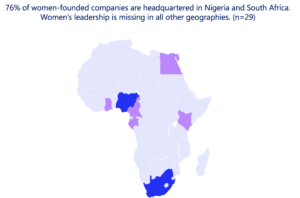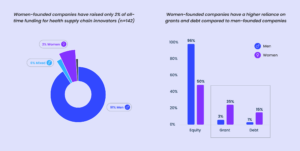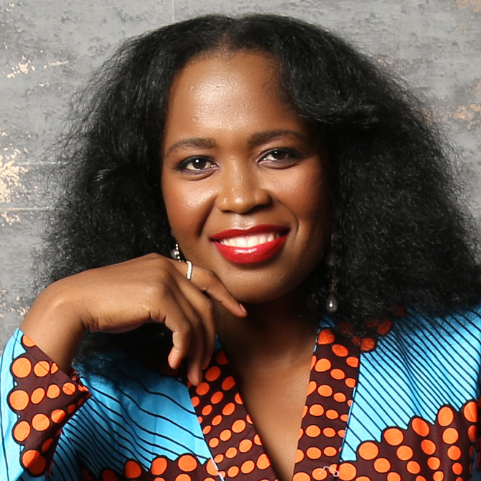In 2022, we estimated that 33% ($56M) of all funding to African health tech went to businesses that offer healthcare supply chain services. However, the ecosystem of healthcare supply chain innovations across Africa is dominated by men.1
Our 2023 market intelligence research provides the first pan-African overview of health supply chain innovations. Using these data, we assessed how women-led businesses are faring within the ecosystem.
Of the 348 health supply chain innovators identified across the continent, only 29 companies are founded solely by women, while 54 companies had mixed-gender founding teams (comprising men and women founders). Nigeria and South Africa serve as geographical hotspots for women founders, as 76% of companies founded solely by women are headquartered in the two countries. Only one solely women-founded company was identified across North Africa.

In this space, like others, women-founded companies are largely unable to access equity financing, and thus appear to be more reliant on grants and debt. 35% of funding raised by women-founded companies consists of grants, compared to 3% for companies solely founded by men. Similarly, 15% of funding received by women-founded companies is debt, compared to 1% for men.
While gender financing disparities persist, there have been some positive developments in recent times. In July 2023, a significant milestone was reached as Kasha, a women-led digital retail platform specializing in women’s health products secured $21 million in a record-breaking series B funding round. This marked the largest funding round ever by a woman-led African health startup. Note that Kasha’s Series B funding round was not captured in this report, as the funding was announced after the report launch.

To better understand the barriers faced by women founders, we held a focus group discussion with key women stakeholders, including four chief executive officers from Nigeria, Gabon and Cameroon, and two ecosystem leaders. An emerging theme from the discussion was to rethink approaches to gender equality which focused on fixing women rather than fixing systems and structures that do not enable gender equality.
“It is not about fixing the women. This is the old-school gender equality approach. In reality, the systems and structures are not working.”
– CEO
In addition to having unequal access to funding, restricted access to opportunities in male-dominated spaces, higher perceptions of risk, and a lack of supportive policies and regulations are some of the challenges faced by women founders in the ecosystem.
“Often, the selection processes are dominated by men, which may result in a negative bias, even if it is unconscious, towards women-led businesses which are considered riskier or to have less potential for growth than projects led by men.”
– CEO
However, while the challenges faced by women founders in African health supply chains are substantial, there is hope for a more equitable future. Addressing funding disparities will require stakeholders to be intentional about limiting or eliminating gender bias through the design of equitable funding mechanisms and consistent engagement of women founders. One example shared by an innovator is that donors can work to ensure public procurement practices specifically include women-led businesses.
“A donor working with a state government to demonstrate a proof of concept could set a mandate for the state or advocate for a percentage of all follow-on funding from the state to be allocated to women-led businesses. The same kind of requirement could be made of large global health agencies like Gavi, The Global Fund, and UNFPA, and so on.”
– CEO
Beyond funding, advocating for women at the highest levels is also vital. Champions play a pivotal role in effecting access for women’s participation in partnership discussions and can organize intentionally curated mentorship programs to empower them with essential skills and support, fostering a collaborative learning environment.
“It’s not only about introductions – women innovators need champions they can engage with at critical decision-making stages [across] the investment/funding process.”
– CEO
To learn more about our findings and recommendations to advance equity in the health supply chain ecosystem, read the report. If you have any questions or comments, please get in touch.
We acknowledge, with appreciation, the support for this work that was provided by Sharon Sutton PhD, Samantha Horrocks, Mara Hansen Staples, and Remi Adeseun. Special thanks to the women leaders building next-generation health systems, whose work continues to inform and inspire us.






